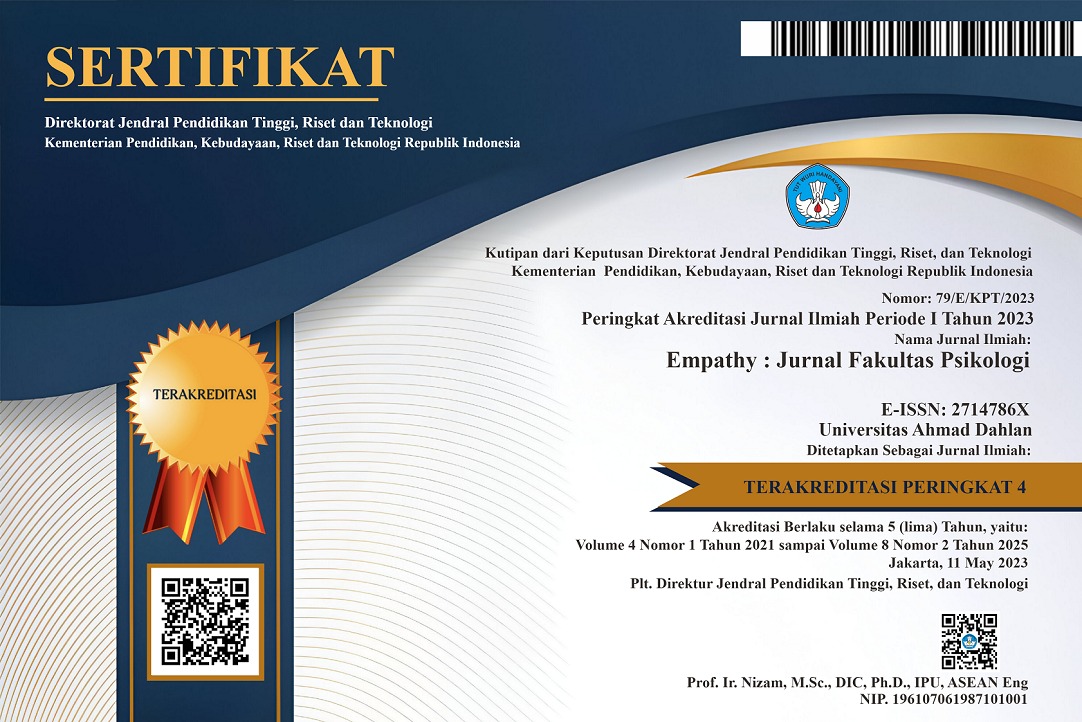Parenting patterns of Vocational High School Students: A case study at Setia Bhakti Vocational High School in Tangerang City
Abstract
Keywords
Full Text:
PDFReferences
Ansori, A., & Sari, A. F. (2020). Inovasi pendidikan di masa pandemi Covid-19. Jurnal Literasi Pendidikan Nusantara, 1(2), 133-148.
Aminullah, A., Ikram, I., Chandra, F., Fitriani, N., Wasna, W., Misna, M., Elihami, E. (2021). Proses pembelajaran selama pandemi covid-19 (Studi pelaksanaan PLP dasar). Journal of Community Empowerment, 3(1), 21-26.
Munir, Z., & Nisa, A. K. (2022). Analisis pola asuh orang tua dalam pembelajaran e-learning pada masa pandemi covid-19. Jurnal Keperawatan Indonesia, 10(1). 213-227. https://doi.org/10.33650/jkp.v10i1.3403.
Hurlock, E. B. (2013). Psikologi perkembangan. Penerjemah: Istiwidayanti dan Soedjarwo. Yogyakarta: Erlangga.
Lestari, S. (2013). Psikologi keluarga: penanaman nilai dan penanganan konflik dalam keluarga. Kencana Prenada Media Group.
Afiyanti, Y. (2008). Validitas dan reliabilitas dalam penelitian kualitatif. Jurnal Keperawatan Indonesia, 12(2), 137.141. https://jki.ui.ac.id/index.php/jki/article/ view/212/pdf_151
Azwar, S. (2019). Metode penelitian psikologi. Pustaka Pelajar.
Creswell, J. W. (2018). Research design: qualitative, quantitative and mixed methods approaches. Los Angeles: SAGE.
Lilawati, A. (2021). Peran orang tua dalam mendukung kegiatan pembelajaran di rumah pada masa pandemi. Jurnal Pendidikan Anak Usia Dini, 5(1), 549-558. DOI: 10.31004/obsesi.v5i1.630.
Kumar, A., Nayar, K. R., & Bhat, L. D. (2020). Debate: covid-19 and children in india. Child and Adolescent Mental Health. https://doi.org/10.1111/camh.12398.
Kusmiati. E., Sari. D. Y., & Mutiara, S. (2021). Pola asuh orang tua dalam membentuk disiplin anak di masa pandemi. Jurnal Pendidikan Anak Usia Dini, 4(2), 78-93. DOI: https://doi.org/10.31851/pernik.v4i2.5424
Danauwiyah, N. M & Dimyati. (2022). Kemandirian anak usia dini di masa pandemi covid-19. Jurnal Obsesi: Jurnal Pendidikan Anak Usia Dini, 6(2), 588-600. DOI: 10.31004/obsesi.v6i2.994
Baumrind, D. (1991). The influence of parenting style on adolescent competence and substance use. The Journal of Early Adolescence, 11(1), 56-95. https://doi.org/10.1177/0272431691111004
Yanuar, A. (2012). Jenis-jenis hukuman edukatif untuk anak SD. Diva Press.
Prasetyo, I., & Utami, F. (2021). Pengasuhan keluarga terhadap perkembangan karakter disiplin anak usia dini. Jurnal Pendidikan Anak Usia Dini, 5(2), 1777-1786. DOI: 10.31004/obsesi.v5i2.985
Sibawaih, I., & Rahayu, A. T. (2017). Analisis pola asuh orang tua terhadap gaya belajar siswa di Sekolah Menengah Atas Kharismawita Jakarta Selatan. Research and Development Journal of Education, 3(2), 172-185. http://dx.doi.org/10.30998/rdje.v3i2.2014
Rini, Y. S. (2014). Komunikasi orang tua anak dalam pengambilan keputusan Pendidikan. Jurnal Ilmu Komunikasi, 3(2), 112-122. https://doi.org/10.14710/interaksi.3.2.112-122
Diponegoro, A. M. (2013). Hubungan pola asuh otoritatif, kontrol diri, ketrampilan komunikasi dengan agresivitas siswa. Psikopedagogia Jurnal Bimbingan dan Konseling, 2(2), 101-111. http://dx.doi.org/10.12928/psikopedagogia.v2i2.2578
Juharta, Y. N. F., Tjalla, A., & Hidayat, D. R. (2015). Perbedaan regulasi diri siswa dalam belajar dilihat dari pola asuh authoritative, authoritarian dan permisif. Insight: Jurnal Bimbingan dan Konseling, 4(1), 1-8. https://doi.org/10.21009/INSIGHT.041.18
Ahmad, H., Irfan, A., Z., & Ahlufahmi, D. (2020). Hubungan antara pola asuh orang tua dengan penyesuaian diri siswa. Jurnal Bimbingan dan Konseling, 5(1) 950-966. DOI: https://doi.org/10.33394/realita.v5i1.2899
Muttalib, S. R.(2020). Dampak pola asuh orang tua terhadap perilaku siswa. Jurnal Sosialisasi Pendidikan Sosiologi, 3(2), 104-108.
Benzet, C., & Kazdin, A. E. (2003). Spanking children: the controversies, findings and new directions. Clinical Psychology Review, 23(2), 197-224. https://doi.org/10.1016/S0272-7358(02)00206-4.
Respati, W. S. (2006). Perbedaan konsep diri antara remaja akhir yang mempersepsi pola asuh orang tua authorian, permissive dan authoritative. Jurnal Psikologi, 4(2), 119-138. 10.6084/m9.figshare.9942455.v1.
Papalia, D. E. (2008). Human development: psikologi perkembangan (ed 9th). Kencana.
Sunarty, K. (2016). Hubungan pola asuh orang tua dan kemandirian anak. Journal of EST, 2(3), 152-160. https://doi.org/10.26858/est.v2i3.3214
DOI: http://dx.doi.org/10.12928/empathy.v6i2.26052
Refbacks
- There are currently no refbacks.
Copyright (c) 2023 Bilqis Pramudiya Wardhani, Dian Ekawati

This work is licensed under a Creative Commons Attribution-ShareAlike 4.0 International License.
================================================================================================
ISSN 2303-114X (print) || 2714-786X (online)
Organized by the Faculty of Psychology
Published by Universitas Ahmad Dahlan, Yogyakarta
Website: http://journal.uad.ac.id/index.php/EMPATHY
email: empathy.jfp@psy.uad.ac.id
Lisensi Creative Commons Atribusi-BerbagiSerupa 4.0 Internasional




